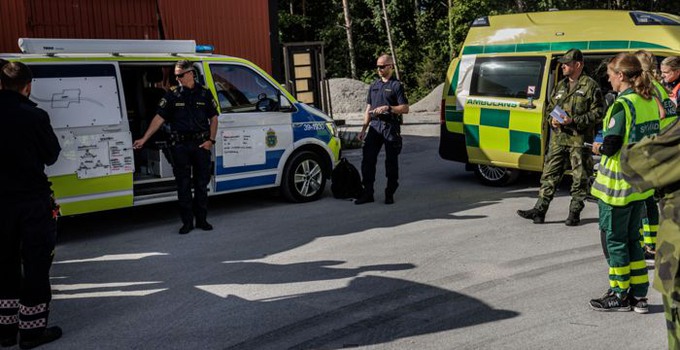
Försvarsmakten övar avancerad sjukvård inom ramen för totalförsvaret tillsammans med polisen och civil sjukvård. Foto: Jonas Helmersson / Försvarsmakten.
How civil-military collaboration affects Swedish total defence
The construction of Swedish total defence introduces tensions and conflicts largely attributable to differing views on how total defense should be implemented, according to a new PhD thesis from the Swedish Defence University.
In her thesis "Rethinking Civil-Military Collaboration: A Relational Practice Approach to Total Defence in Sweden," Hanna Deiaco examines how relational dynamics among various actors affect the structure of Swedish total defense.
"I focus on the underlying relational factors that shape the collaboration between civilian and military actors," she says.
Power struggles and capital distribution
The thesis reveals how Sweden's total defense is organised as a field with various underlying areas where power struggles and capital distribution play significant roles. The results indicate significant tensions and conflicts arising from differing views on how total defense should be implemented.
"There is a military logic and a civilian crisis management logic. These opposing views can create friction," says Hanna Deiaco.
Focus on underlying relationships
The purpose of the research is to gain a deeper understanding of the relational dynamics that shape civil-military collaboration in Sweden.
"Previous studies have focused more on instrumental aspects, such as mutual dependency. I wanted to explore the underlying relational dynamics that occur when conducting total defence planning or preparations with multiple different actors", she explains.
She has used the theoretical concepts of French sociologist Pierre Bourdieu and conducted interviews and observations to observe how these dynamics are manifested in practice.
"I have participated in observing total defense efforts conducted by the Swedish Armed Forces and the Home Guard, as well as at the Swedish Defence University, to gain a deeper understanding of how individuals and groups navigate within and between different total defense areas," she says.
Managing relational dynamics for better collaboration
The conclusions of the thesis can be particularly valuable for policymakers and those involved in total defense planning, suggests Hanna Deiaco.
"The results highlight the importance of understanding and managing ongoing underlying relational dynamics to create more sustainable and equitable collaborations," she says.
"The thesis also emphasises the need to broaden the recognition of civilian actors' roles in total defense, especially in light of what is referred to as hybrid threats, where many different societal actors are required to contribute to total defense," she continues.
Publication
Hanna Deiaco (2024): Rethinking Civil-Military Collaboration: A Relational Practice Approach to Total Defence in Sweden
Hanna Deiaco defended her PhD thesis in Political Science at the Swedish Defence University on 30 August 2024.
Page information
- Published:
- 2024-08-30
- Last updated:
- 2025-01-07
